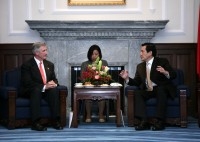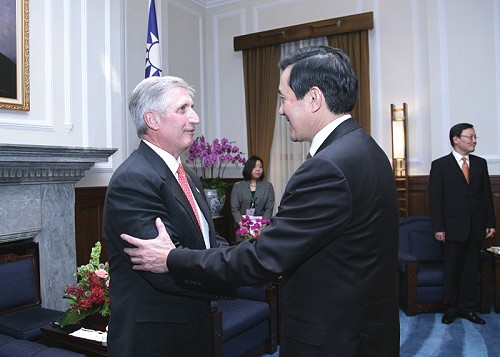News & activities
 News releases
News releases

President Ma Ying-jeou and Vice President Vincent C. Siew at noon on May 20 met with former White House Chief of Staff Andrew Card and a delegation from the United States to attend the inauguration ceremonies for President Ma and Vice President Siew. Meeting at the Presidential Office, the visitors and President Ma exchanged opinions on the future development of cross-strait relations. President Ma also expressed his gratitude to the visitors for making the long trip to Taiwan to attend the inauguration proceedings.
During the meeting, Mr. Card presented a letter of congratulations to President Ma from United States President George W. Bush. In addition to expressing his appreciation, President Ma also asked the former Chief of Staff to take a letter from him back to the United States to give to President Bush.
President Ma thanked President Bush for referring to Taiwan as a beacon for democracy in Asia and the world. President Bush made the remarks in a congratulatory message sent after the March presidential election here. President Ma said the remarks were deeply moving. He added that the ROC Constitution states the concept of "of the people, by the people and for the people," which are the same ideals for government as expressed by US President Abraham Lincoln. Dr. Sun Yat-sen's political ideas were inspired by those of President Lincoln, he said. President Ma added that both countries share the same convictions and foundation.
President Ma stressed that Taiwan desires to be an architect of peace. He said he also hopes to maintain Taiwan's defense budget at no less than 3% of GDP. This is an important pledge, he said. It not only demonstrates Taiwan's determination to strengthen its ability to defend itself, but also intends to enhance Taiwan's "soft power" as a means to offset the potential threat posed by mainland China. This is the reason he hopes to improve cross-strait relations, he said. President Ma said that he stressed the principle of "no unification, no independence, and no use of force" in his inauguration address, adding he is confident that mainland leaders welcome such a pledge.
President Ma stressed that the new government will adopt a more open and flexible policy toward mainland China in the future. He said that if direct flights between the two sides can be realized, Taiwan will become not only a market for the United States, but a springboard for the US business community in entering mainland China. Direct flights would add convenience and provide benefits to the Taiwan public, foreigners and multinational firms in Taiwan, he said.
Former Chief of Staff Card said he brought the good wishes of President Bush with him on this trip and is passing along President Bush's hopes that President Ma's leadership will bring new opportunities for the people of Taiwan. The American people are also delighted by these prospects. Mr. Card said the United States and Taiwan have always maintained an extremely friendly and important relationship. He said he hopes these friendly relations can reach to mainland China and other neighboring countries. He expressed that the content of President Ma's inauguration address was outstanding and left a deep impression on people. He also praised Taiwan for its mature democracy, the successful and peaceful transfer of power, its hardworking people and its economic strength. Taiwan serves as a model of success for other countries, he said.



